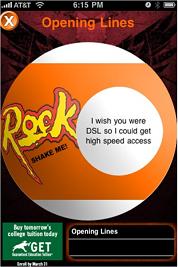Our jacAPPS division has grown by leaps and bounds in the past three years, thanks largely to robust interest in the mobile space and a strong staff of hard-working Michiganders who are great at what they do.
We get asked a lot about what makes a great app, the questions that brands need to ask about mobile, and why a solid mobile strategy is one of the most important things a station can develop. And now that we’re on the precipice of building our 500th app, a look back on what has happened in the mobile space is of value because it speaks volumes about just how fast-moving it is.
 The first thing we’ve learned is that nearly 100% of our jacAPPS customers have never bought an app before. That may not strike you as all that meaningful until you think about what it would be like to buy or lease a car when you’ve never ever set foot in a dealership. As you know, there’s a lot more going on than pointing to a hot new model in the showroom, and declaring, “That’s the one I want.”
The first thing we’ve learned is that nearly 100% of our jacAPPS customers have never bought an app before. That may not strike you as all that meaningful until you think about what it would be like to buy or lease a car when you’ve never ever set foot in a dealership. As you know, there’s a lot more going on than pointing to a hot new model in the showroom, and declaring, “That’s the one I want.”
But that’s essentially what happens when most companies call us to look into getting involved in the mobile space. Oftentimes, we hear this: “I want an iPhone app.” Or “What does it take to get into the iTunes Store?” Or “So besides streaming, what else do I really need in the app?”
Now while these are valid inquiries or requests, they merely skim the surface of what it means to put together a successful mobile program. Back in the early part of 2011, Google’s Eric Schmidt revealed his three-word mantra that defines how his company approaches new ventures and initiatives:
Do mobile first.
That’s because the mobile space is the be-all-and-end-all – the destination – the Holy Grail of new media platforms. And at Google, they consider mobile in every innovation and initiative they launch.
So if you buy his logic – and you should – what are some of the requirements that go into building a viable mobile strategy?
Well, a lesson in improving your “app-titude” was recently given by Adam Brotman, Starbucks’ VP/GM of Digital Ventures. In January of this year, the coffee giant launched its first mobile app that allowed users to pay for coffee (and everything else) on their smartphones, reload their cards, find nearby stores, and perform other tasks.
The Starbucks app’s features and functionality have been driven by research – not by gut. As Brotman points out, “Innovation, responding to customer feedback and enhancing the customer experience are at the core of Starbucks’ mission.”
These are good goals, and they are well within the reach of any brand looking to succeed in mobile.
It starts with research. How do you assess the optimal features in an app? Simple. Because a large percentage of the population carries a smartphone and the majority of them download apps, we’re dealing with a discriminating customer base that understands what they want – and what they don’t – from branded apps.
If you have a database, you have a powerful research tool to determine the best components of a mobile strategy. This includes determining the types of devices your customers own all the way down to the specific features, bells, and whistles they would treasure in an app.
 Of course, it’s always fun to build in a cool surprise or two that will get them talking. Our KISW app, for example, features a 9-Ball feature that the customer can shake to get different messages. The KISW team regularly re-programs their 9-Ball questions depending on who’s touring, what’s happening, and what strikes them as funny.
Of course, it’s always fun to build in a cool surprise or two that will get them talking. Our KISW app, for example, features a 9-Ball feature that the customer can shake to get different messages. The KISW team regularly re-programs their 9-Ball questions depending on who’s touring, what’s happening, and what strikes them as funny.
What about revenue? There are lots of ways to make money in mobile, but it starts with a financial plan and an understanding with your sales department. Ad insertion, ad networks, rotating panels, pop-up ads, and sponsorships are all part of the mix. What’s right for your station or brand is something that is smart to discuss before the app is designed and launch. Many brands are making money with mobile, but few are profiting without a game plan that started this process.
Once the app is built, it has to be marketed. We are often surprised by how few companies and brands consider this all-important next step in the planning process. Radio (and media companies) have an advantage because they often have a large, attentive audience. Well-crafted promos and live reads will drive downloads. But that doesn’t always happen because oftentimes, radio clients excitedly promote their new app for a few weeks, until the next big thing comes along. Then the mobile program gets “back-burnered,” despite the fact that hundreds, if not thousands, of listeners get their new smartphone each week. And here comes iPhone 5.
But what if you don’t have a built-in listening audience, viewership, or readership? You need to consider a marketing program that can be assessed and measured. And it may be a good idea to work with media partners in this pursuit, too. (Attention radio and TV stations: you could market “app exposure packages” to businesses.)
Of course, the next step is usability. You can design a perfectly wonderful app with all the best features, but until you watch smartphone owners using it, you may be missing a big piece of the app pie. That’s where usability studies come into play.
These simple 1-on-1 exercises are a great way to instantly get the feel for how easy (or difficult) it is to find and use features on the app. Because the consumer’s tolerance for things that don’t work the first time is diminishing, it is essential for apps to work well when they’re downloaded. Nothing’s perfect with apps, but the goal is to make them as seamless and elegant as possible.
Then there’s analytics – Determining the features that consumers actually use the most in an app. We use a company called Localytics, but there are several services that can tell you the same essential story. And of course, there’s the matter of tracking app downloads and comments – two essential pieces of feedback that are common to the mobile space.
We hope your brand has gotten the message from Eric Schmidt about the need to “go mobile.”
For more information about developing a sound mobile strategy, contact Paul Jacobs at jacAPPS.
- A 2020 Lesson?It Could All Be Gone In A Flash - April 24, 2025
- How AI Can Give Radio Personalities More…PERSONALITY - April 23, 2025
- Can Radio Afford To Miss The Short Videos Boat? - April 22, 2025





Great information, Paul. Love the KISW app example!